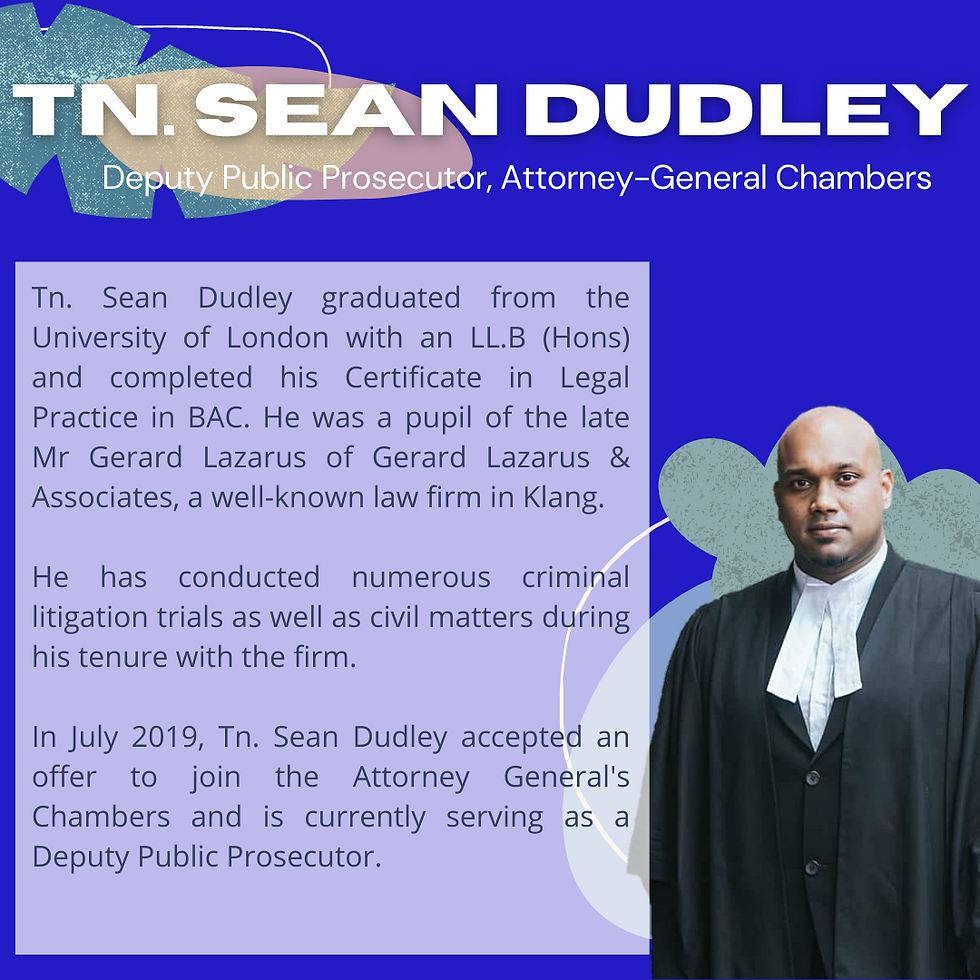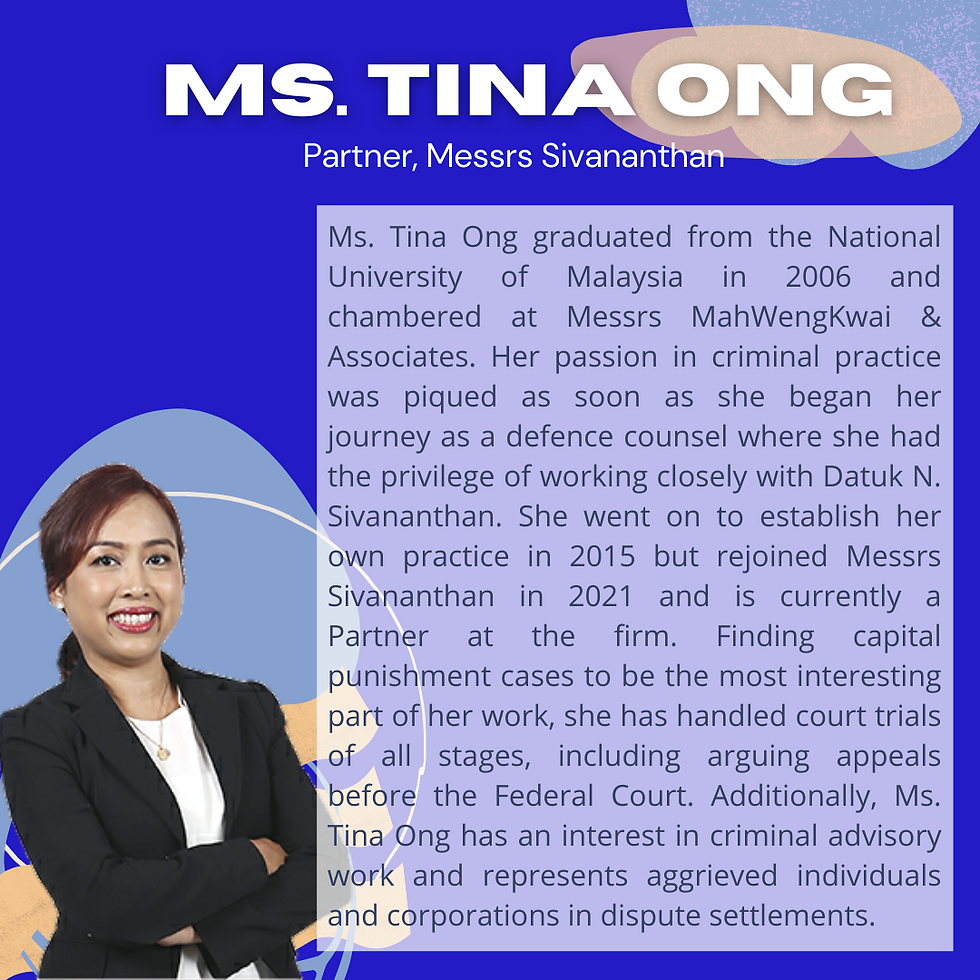Life As a Criminal Lawyer
- Jessie Gan
- Apr 10, 2021
- 9 min read
In reality, the common thread running through both jobs is that in order to qualify as either a criminal defence lawyer or apply for a job as a public prosecutor, one must possess a qualifying law degree! Instead of giving credence to myths and word-of-mouth, Lexicon is here to enlighten you with first-hand insights from Tn. Sean Dudley, who is a deputy public prosecutor with a background in criminal law and Ms. Tina Ong, who is a criminal lawyer by profession.


In line with the fundamental theory of free will, Lexicon does not have the intention to dissuade students from pursuing their ambitions. Rather, we aim to lay down the facts as it is so that way students will be able to make a more informed decision regarding their future career path!
What does a typical day for a public prosecutor and criminal lawyer look like respectively?
Crimes happen anywhere and at any time so it would be implausible for both a prosecutor and a criminal lawyer to have a fixed, monotonous routine. Despite how vastly different the two professions may seem, going to court is almost always a guarantee, which may provide some semblance of a routine.
On one end of the spectrum, Tn. Sean Dudley will start his day checking the documents which he intends to tender in court, consisting of copies of relevant documents, exhibits and attendance of witnesses. As part of the preparation to refute counter-arguments by defence lawyers, Tn. Sean Dudley will hit the books and print relevant case laws to submit in the trial.
Upon the conclusion of a trial, Tn. Sean Dudley will proceed to file his written submission and conduct legal research to look for relevant and applicable authorities to support his case to establish the elements of the offence. The final step is crafting his written submission, however, the battle is not over yet as the waiting game commences, which means that he would have to wait until the date of ruling to find out whether his hard work has come to fruition. Once he has settled case mentions in court, he will return to his office and meet investigative officers who seek instructions to charge for their cases that have been investigated where he will proceed to examine the investigation papers diligently and review charging decisions, followed by further instructions to be carried out.
Things are not that much different with a criminal defence lawyer. Based on Ms. Tina Ong’s experience, if there is an upcoming trial in court, the preparation for it usually takes place months before the trial. Upon getting a brief from the client, the work starts almost immediately, usually entailing site visits at the crime scene, interviewing potential defence witnesses, gathering information to support the client’s defence and many other strategies depending on the nature of the case at hand. Of course, researching the relevant case laws and authorities concerning the criminal charge against the accused person is also an essential part of the job!
As riveting as criminal law might sound, life is not all that glamorous for Ms. Tina Ong. On a “normal” day, which is a day without any trial going on in court, she will catch up on other pending work in the office such as drafting submissions or letters to the court, study documents for upcoming trials and meeting clients at the office. Ms. Tina Ong would also conduct prison visits for those clients who are being remanded pending disposal of their case in Court.
Why criminal law?
Recalling an experience that left a memorable impact on him, Tn. Sean Dudley shared that his ardour for criminal law stemmed from his encounter as a pupil at the Klang High Court. A man approached him, pleading with tears for help as his father had been wrongfully detained for a crime he did not commit. The man’s father was diagnosed with a chronic illness, which meant that the longer he was remanded, the worse his deterioration would be. Although he lacked experience as he was only a pupil back then, his courage of conviction led him to make a decision that subsequently had a profound impact on his life that fine day. Without hesitation, he gave it his all, conducted remand proceedings and even managed to get the man’s father released all in the same day!
To him, however, the icing on the cake was seeing the joy on the faces of the man’s family, especially his son which provided him with a great sense of gratification. Jokingly calling it “helpers high”, Tn. Sean Dudley shared that the fulfilment he received from the job served as the turning point which kindled his interest in this field of law.
Apart from the inspiring anecdote, he believes that his decision to pursue criminal law was not a choice but, in fact, a calling. As a greenhorn, he grew a knack for criminal law, driven by the fact that most of the work he was exposed to during his pupillage was predominantly criminal matters. Fuelled by his desire to pursue the practice further, he applied to the prestigious Attorney General’s Chamber to become a Deputy Public Prosecutor. As of today, he is currently working in Sarawak.
Echoing his notion, Ms. Tina Ong finds criminal law very exciting as she loves meeting and dealing with people from all walks of life and this profession enables her to come across many colourful personalities.
As a matter of fact. Ms. Tina Ong also experienced an incident which left a profound impact on her. Back when she was in kindergarten, she defended a classmate from being bullied, which served as a stepping stone in developing her empathy for others as she believes that this very attribute has enabled her to understand her clients better. She has always known that her purpose in life is service to others, and through representing the accused persons in court, she is often reminded that everyone is entitled to a just and fair representation, regardless of what the outcome may be. Even though she may be serving on the other side of the fence from Tn. Sean Dudley, they both share an unlikely common purpose - to ensure that affected parties have the right to be heard.
Regardless of where your allegiance lies, justice has two sides. Now, how can we ensure that justice is served if we refuse to listen to both sides of the story?
How would you say your job differs from lawyers in other areas of practice?
In criminal cases where emotions run high, both prosecutors and criminal lawyers are expected to maintain the utmost professionalism. Unlike civil matters where disputes usually result in either monetary losses or grains, depending on the outcome, the reality of criminal litigation is far grimmer. Liberty and lifeline, depending on the charge proffered, is at stake. To put it bluntly, this is not a game of poker where you can cross your fingers and hope for the best. It is a serious business where the butterfly effect comes in full swing, as one thing would almost always lead to another bigger thing. The stakes are extraordinarily high but the magnitude of such a responsibility is even higher.
“Cold” and “heartless” are among some of the common words used to describe public prosecutors and according to Tn. Sean Dudley, the stigmatisation attached that individuals in this line of work view each prosecution as another trophy on their mantlepiece perpetuates a negative stereotype. Prosecutors do not find joy in taking liberty and life away from people.
Described aptly by Aristotle that “the law is reason, free from passion”, prosecutors have a constitutional and ethical obligation to do what is right. With a mandate to exercise the sovereign power of the State, prosecutors represent the best interests of the community and play a key role in maintaining the equity and efficiency of the criminal justice system.
It is a common misconception that criminal lawyers are regarded as antagonistic figures because they work for the “other” side. This is not the case as the criminal justice system is far too complex to be reduced to a proposition of black and white. While the labels of “guilty” and “innocent” exist, it is not a criminal lawyer’s job to judge which label his or her client falls under because ultimately, the court will have the final say.
Ms Tina Ong has not been immune from the mental gymnastics of the practice. Back when she was a novice, she volunteered to represent a man who was “accused” of raping his young daughter. She recalled how she started on the wrong foot by asking her client whether he committed the crime. Consequently, the result of the conversation clouded her judgment, which prevented her from discharging her duties as a defence lawyer that day. Ever since then, Ms. Tina Ong always takes the middle ground approach - conquer and retreat because, in the eyes of justice, everyone is equal.
What is one thing you love about your job?
According to Tn. Sean Dudley, one thing will do no justice to this great profession as there is a myriad of reasons why he loves this job. Nonetheless, he pinpoints the art of advocacy at play in a criminal trial. Crediting the flexibility in terms of procedures during the trial stage where not too many rigid rules come into force, he believes that this provides lawyers and prosecutors alike the room to develop their advocacy skills.
Although going head-to-head with different criminal lawyers of seniority from the other side of the bar may appear daunting, he chooses to tilt his perspective. Instead of focusing on winning, he relishes the opportunity to learn from them, which in turn helps improve his advocacy, in addition to preserving the sanctity of tradition. The same applies to Ms. Tina Ong as well. Being able to conduct a trial and argue a case before the court always excites her, no matter who her opponents may be.
Additionally, both Tn. Sean Dudley and Ms. Tina Ong agree that the people they meet along the way have helped them gain meaningful insights into life.
What is one thing you would change about your job if you could?
There is not a single thing Tn. Sean Dudley would change about his job but candidly mentions that perhaps the dress code could be spiced up a little to accommodate a wider range of shades for dark coloured suits.
On the other hand, the one thing Ms Ong dislikes about her job is when she encounters rude individuals. Nonetheless, this does not happen frequently.
What is the most challenging aspect of your job?
More often than not, Ms. Tina Ong has to deal with the stigmatisation that criminal lawyers are commonly viewed as “cheaters” and “liars”. While these degrading comments can be disheartening, she takes it with a grain of salt as she knows that this blanket approach is skewed. In actual fact, criminal lawyers are professionals tasked with the job to deliver the best outcome for their clients and help them affirm their right to a fair trial.
Due to the nature of work as a criminal lawyer, not many female lawyers choose this field. Being one of the few in the area, Ms. Tina Ong has never encountered any discrimination from anyone, be it from the prosecution or the bench. In fact, being a female criminal defence lawyer has its own advantages. As to what exactly are those advantages, her reply is, “for me to know and for you to find out!”
“Convincing the learned judge” was Tn. Sean Dudley’s instinctive reply. Suffice to say, this is not an easy feat, especially in situations where a much more experienced counterpart on the other side of the bar is eagerly waiting to object to the applications that have been made. Arguably far more sophisticated than the classic utterance of “I object”, one has to be able to withstand the pressure and develop the ability to think on your feet, which will come with both experience and time.
What has been the most memorable moment in your career thus far?
Contrary to expectations, a moment forever etched in Tn. Sean Dudley’s memory can be deemed as somewhat peculiar - the question he posed to the witness caused him to say something funny amidst a particularly tense situation in court, resulting in everyone present to have a good laugh. While the courtroom may be a bloodbath at times with arguments spurring to and fro, light-hearted moments like these showcase that we are human after all.
Being a woman in criminal law is a challenge in itself but Ms. Tina Ong has proven that gender is not a deterrent from succeeding in the profession. When she was eight months pregnant, she conducted her very first section 39B trial on the Dangerous Drugs Act 1952 and even bagged home a win! Balancing the duties of her job and motherhood is certainly no easy feat, and she will remember the moment for the rest of her life.
Do you have any advice for aspiring law students or young lawyers who intend to pursue criminal law and prosecution?
Have passion and determination.
“You need both to survive in criminal practice. It is not easy, but definitely doable if you possess the right attitude. Passion and determination must coexist if you want to attain success in the long run.” - Ms. Tina Ong
Keep both feet grounded all the time.
“As you progress as a criminal lawyer, you will be exposed to many things, be it good or bad. If you don’t stay grounded, you will be easily swayed and subsequently there is no point of return from there.” - Ms. Tina Ong
Plunging straight into your intended practice areas is not ideal.
“Do not solely depend on one area of law if you intend to stay in private practice. Only choose your area of specialisation after a few years in practice doing both civil and criminal. Take your time and enjoy the process.” - Tn. Sean Dudley
Find a good mentor.
“Training under a good mentor is like having a good father or mother, you will inherit a lot of his or her traits so be mindful of who holds the torch in front of you.” - Tn. Sean Dudley
Lexicon hopes that the Life-As Series has achieved its purpose and given you a clearer depiction of what life within these areas of the law is like. We would, however, like to note that everyone has their own individualised experiences, and this article is purely based on the input of the lawyers we interviewed. On that note, we would like to take this opportunity to thank Tn. Sean Dudley and Ms Tina Ong. Lexicon could not have produced this article without their generosity, input and advice.



Comments